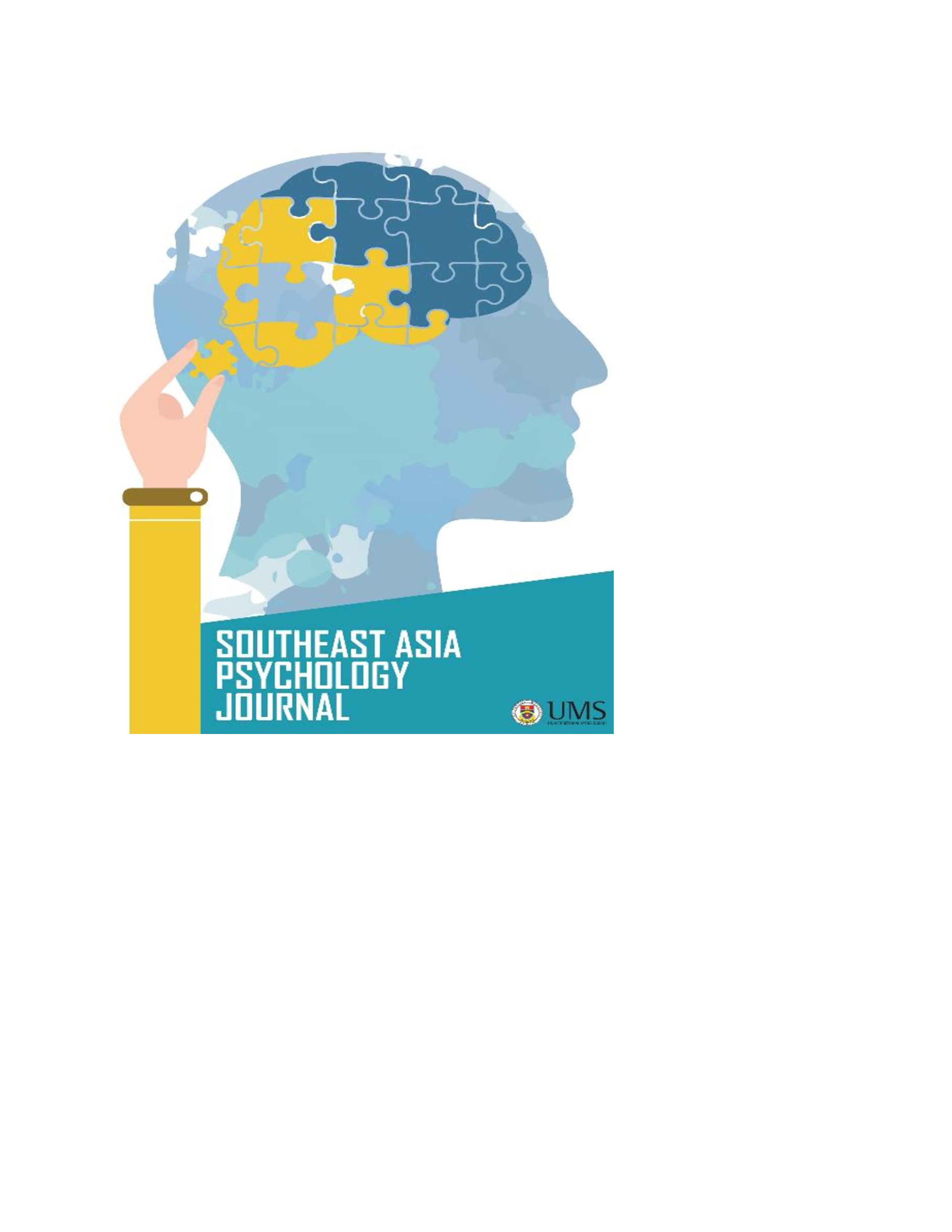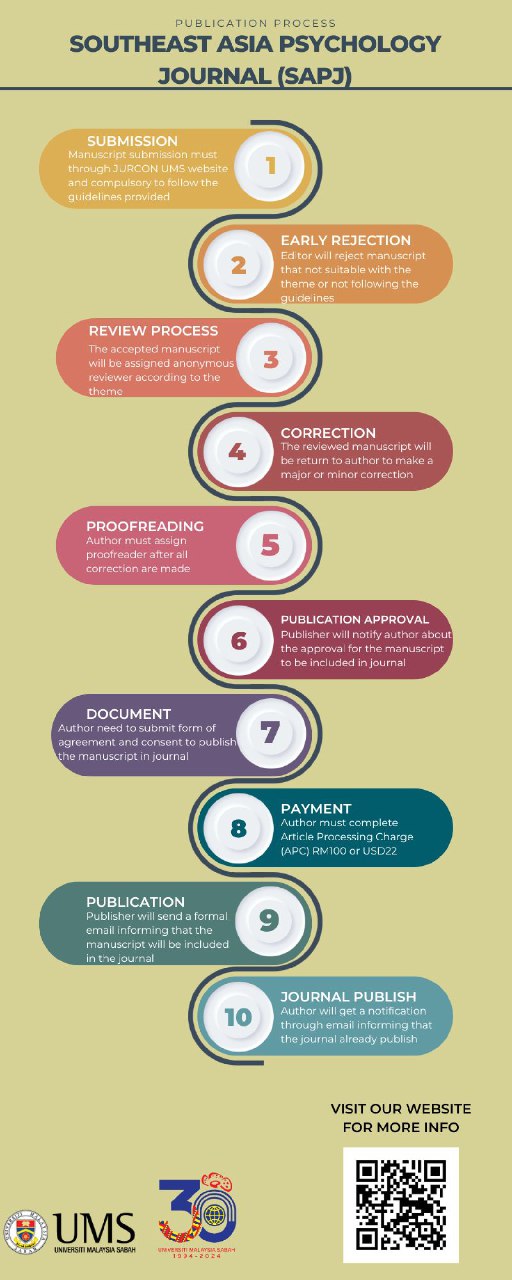THE EFFECT OF PERCEIVED SUPPORT ON SUBJECTIVE WELL-BEING OF ACADEMIC INSTITUTION STAFF
DOI:
https://doi.org/10.51200/sapj.v11i2.4894Keywords:
Subjective Well-Being, Perceived Support, Higher InstitutionAbstract
This study aimed to examine the effects of perceived support on subjective well-being (SWB) among university staff in the context of COVID-19. The research sample comprised of 522 employees from Malaysia public universities, which included both academicians and non-academicians. The respondents completed two online questionnaires. Statistical analyses used were descriptive statistics and regression. The results revealed that perceived support directly affects higher institution employees’ subjective well-being. The study confirmed the importance of perceived support for university employees’ subjective well-being.
References
Adyani, L., Suzanna, E., Safuwan, S., & Muryali, M. (2019). Perceived social support and psychological well-being among interstate students at Malikussaleh University. Indigenous: Jurnal Ilmiah Psikologi, 3(2), 98–104.
Al Issa, H. E., & Jaleel, E. M. (2021). Social isolation and psychological well-being: Lessons from Covid-19. Management Science Letters, 11, 609–618. https://doi.org/10.5267/j.msl.2020.9.006
Brislin, R. W. (1970). Back-translation for cross-cultural research. Journal of Cross-Cultural Psychology, 1(3), 185–216.
Chou, P. (2015). The effects of workplace social support on employee’s subjective well-being. European Journal of Business and Management, 7(6), 8-19.
CIPD. (2021). Health and wellbeing at work. CIPD. https://www.cipd.co.uk/knowledge/culture/well-being/health-well-being-work#gref
Cohen, J. (1988). Statistical Power Analysis for the Behavioral Sciences (2nd ed.). Lawrence Erlbaum Associates.
Cohen, J. (2013). Statistical Power Analysis for the Behavioral Sciences. Academic press.
Cohen, S., & Wills, T. A. (1985). Stress, social support, and the buffering hypothesis. Psychological Bulletin, 98(2), 310.
Diener, E. (1984). Subjective well-being. Psychological Bulletin, 95(3), 542.
Diener, E., Suh, E. M., Lucas, R. E., & Smith, H. L. (1999). Subjective well-being: Three decades of progress. Psychological Bulletin, 125(2), 276. Firth, L., Mellor, D. J., Moore, K. A., & Loquet, C. (2004). How can managers reduce employee intention to quit. Journal of managerial psychology, 19(2), 170-187. Fuller, J. B., Hester, K., Barnett, T., & Relyea, L. F. C. (2006). Perceived organizational support and perceived external prestige: Predicting organizational attachment for university faculty, staff, and administrators. The Journal of social psychology, 146(3), 327-347. Hirai, T., Comim, F., & Ikemoto, Y. (2016). Happiness and human development: A capability perspective. Journal of International Development, 28(7), 1155-1169.
Huang, L., & Zhang, T. (2021). Perceived social support, psychological capital, and subjective well-being among college students in the context of online learning during the Covid-19 Pandemic. The Asia-Pacific Education Researcher, 31(5), 563-574. Isaac, S., & Michael, W. B. (1995). Handbook in research and evaluation: A collection of principles, methods, and strategies useful in the planning, design, and evaluation of studies in education and the behavioural sciences. Edits publishers.
Karademas, E. C. (2006). Self-efficacy, social support and well-being The mediating role of optimism. Personality and Individual Differences, 40(6), 1281–1290.
Kasser, T., & Sheldon, K. M. (2009). Time affluence as a path toward personal happiness and ethical business practice: Empirical evidence from four studies. Journal of Business Ethics, 84, 243–255.
Kim, H., & Florack, A. (2021). When social interaction backfires: Frequent social interaction during the Covid-19 pandemic is associated with decreased well-being and higher panic buying. Frontiers in Psychology, 12(5), 1–11.
Krejcie, R. V., & Morgan, D. W. (1970). Determining sample size for research activities. Educational and Psychological Measurement, 30(3), 607–610.
Leal Filho, W., Wall, T., Rayman-Bacchus, L., Mifsud, M., Pritchard, D. J., Lovren, V. O., Farinha, C., Petrovic, D. S., & Balogun, A. L. (2021). Impacts of Covid-19 and social isolation on academic staff and students at universities: A cross-sectional study. BMC Public Health, 21(1), 1–19.
Lu, L. (1999). Personal or environmental causes of happiness: A longitudinal analysis. Article in The Journal of Social Psychology, 139(1), 79–90.
Lyubomirsky, S., & Lepper, H. S. (1999). A measure of subjective happiness: Preliminary reliability and construct validation. Social Indicators Research, 46(2), 137–155. https://doi.org/10.1023/A:1006824100041
Malone, C., & Wachholtz, A. (2018). The relationship of anxiety and depression to subjective well-being in a mainland Chinese sample. Journal of Religion and Health, 57, 266-278.
Osborne, J. W. (2016). Regression & linear modeling: Best practices and modern methods. Sage Publications.
Panaccio, A., & Vandenberghe, C. (2009). Perceived organizational support, organizational commitment and psychological well-being: A longitudinal study. Journal of Vocational Behavior, 75(2), 224–236.
Rahnfeld, M., Palmerk, & Cox, T. (2013). Social Support at Work. OSHWiki. https://oshwiki.eu/wiki/Social_Support_at_Work
Song, Y., & Gao, J. (2018). Does telework stress employees out? A study on working at home and subjective well-being for wage/salary workers (Research Discussion Paper RDP 11993). IZA Institute of Labor Economics. https://docs.iza.org/dp11993.pdf
Spector, P. E., & Jex, S. M. (1998). Development of four self-report measures of job stressors and strain: Interpersonal conflict at work scale, organizational constraints scale, quantitative workload inventory, and physical symptoms inventory. Journal of Occupational Health Psychology, 3(4), 356–367.
Van der Doef, M., & Maes, S. (1999). The Leiden Quality of Work Questionnaire: Its construction, factor structure, and psychometric qualities. Psychological Reports, 85(3), 954–962.
Van Yperen, N. W., & Hagedoorn, M. (2003). Do high job demands increase intrinsic motivation or fatigue or both? The role of job control and job social support. Academy of Management Journal, 46(3), 339–348.
Wikipedia Contributors. (2020). Discriminant validity. Wikipedia, The Free Encyclopedia. https://en.wikipedia.org/wiki/Discriminant_validity
Yoon, J., & Thye, S. (2000). Supervisor support in the work place: Legitimacy and positive affectivity. Journal of Social Psychology, 140(3), 295–316. https://doi.org/10.1080/00224540009600472








